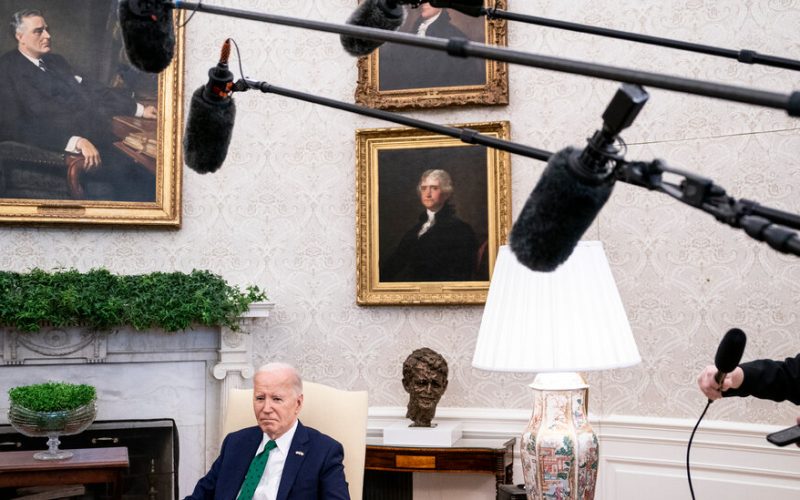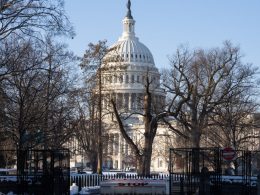A portrait of Franklin Delano Roosevelt has hung over the fireplace in the Oval Office since the very beginning of Joe Biden’s presidency, a break with the longstanding tradition of giving George Washington that prized spot.
It was a tribute to a president whom Biden had invoked during his campaign, whom he admired for prioritizing the working class and who seemed to be a kind of North Star for a presidency in which Biden hoped to use government to protect the vulnerable.
Some of his allies have said he lived up to that ambition, at least to a degree.
“President Biden, when he came into office, said that he would be the most progressive president since F.D.R., and I think on domestic issues — not on foreign policy — on domestic issues, he has kept his word,” Senator Bernie Sanders, independent of Vermont, said shortly after Biden’s loss.
Comparing a one-term president to F.D.R. might be a little like comparing me, your humble newsletter writer, to Shakespeare or Robert Caro. But it’s an example of the kind of lofty praise for Biden that has been emanating from a corner of his party that would have seemed unimaginable for much of his career: the left.
“When it comes to domestic policy, President Biden probably would go down as one of the most effective presidents that centered the working class,” Representative Alexandria Ocasio-Cortez, Democrat of New York, told me this afternoon, although she added that she disagreed deeply with him on foreign policy issues such as the war in Gaza.
“I was surprised at the openness that was exhibited in his administration, particularly in the earliest days,” Ocasio-Cortez said.
What a president leaves behind
For much of his political career, Biden was seen as the embodiment of political moderation. But in the spring of 2020, when he was battling Sanders for the Democratic presidential nomination, he promised in an interview that, if elected, his administration would “go down as one of the most progressive” in U.S. history.
Biden’s allies point to the trillions of dollars his administration pumped into recovering from the coronavirus pandemic, rebuilding infrastructure and addressing climate change, and to his push to re-industrialize the nation with measures like the CHIPs bill.
He was the first sitting president to join workers on a picket line; he canceled student loan debt for five million borrowers; and his administration took aggressive steps to curb corporate power.
“It was very clear that he understood the full breadth of the coalition that helped him earn his presidency,” Ocasio-Cortez said, “and he sought to translate that into his governance.”
Julian Zelizer, a presidential historian at Princeton, said Biden’s accomplishments placed him in the tradition of F.D.R. and other Democrats who believed that government could expand social equality.
But what made Roosevelt successful wasn’t just the policies he enacted — it was also the fact that he was re-elected three times. “Part of it is what you leave behind,” Zelizer said. “Part of it is to build a really durable coalition that will not only continue to grow those programs but will also fight down the line once you’re gone. In this case, that’s not exactly what happened.”
My colleague David Leonhardt wrote this morning that Biden’s way of thinking about the economy and the government’s role in it might outlive his presidency.
That’s what his advisers believe will happen.
“If the seeds that the Biden administration has planted through our industrial policy are allowed to flourish, that has the potential to be economically transformational,” Jared Bernstein, Biden’s chief economist, told me.
He added: “I don’t care what color your politics are — even if they’re deep red — you’re not going to take a wrecking ball to a manufacturing facility that’s being built in your backyard.”
Fighting for credit
Shortly after Biden took office in 2021, Representative Rosa DeLauro, Democrat of Connecticut and a longtime member of the Congressional Progressive Caucus, visited Biden in his office with other high-ranking House Democrats. She looked at the portrait of Roosevelt and told Biden that F.D.R. had lifted seniors out of poverty by creating Social Security. Biden, she said, could do the same for children by establishing a child tax credit — which he did that year.
“He took the side of working men and women in this country, and that’s where he came from,” DeLauro said.
The problem, of course, was that the credit lapsed after Congress failed to extend it.
Biden was not able to accomplish many progressive priorities, like raising the minimum wage or a proposed major expansion of government support for child care. If he governed as an economic progressive in many ways, he struggled to get voters to reward him for even his most popular achievements, like using the government’s negotiating power to lower drug prices.
“When you take a look at progressive action, progressive policies, those are the things that really make a difference for working people, right?” said Representative Becca Balint of Vermont, another progressive Democrat, who praised Biden’s work on climate and infrastructure. “But people have to be able to name them right off the top of their heads,” she continued, adding: “And that didn’t happen.”
Progressives say Biden recognized that the rise of Sanders — who placed a distant second to Biden for the 2020 Democratic nomination — was a harbinger of change in their party. And they credit Biden for responding to it.
“He understood, more than his colleagues, that the party had shifted,” Representative Ro Khanna, Democrat of California, said. “We were co-partners in shaping the agenda in a way progressives have not been.”
Ocasio-Cortez argued that, at least in a small way, the economic progressivism that animated parts of Biden’s presidency will survive through Democrats who managed to win close races in tough districts last year.
“Many of them embrace a populist streak that, I hope, is enduring,” Ocasio-Cortez said.
How Gretchen Whitmer is thinking about Trump II
Some Democrats have already vowed to oppose Trump. But others are approaching his coming administration with something a little subtler. My colleague Katie Glueck spoke with Gov. Gretchen Whitmer in Detroit today, where the governor offered new insight into her posture against the incoming administration. I asked Katie to tell us more:
Gov. Gretchen Whitmer of Michigan, a leading Democrat from one of the nation’s most important battleground states, sketched out her approach to Trump in a speech at the Detroit Auto Show on Wednesday.
The gist: Seek common ground on issues like lowering costs and creating manufacturing jobs, while holding the line against ideas like Trump’s threatening of Canada with tariffs.
In an interview before the speech, Whitmer, who like Trump has twice won statewide in Michigan, summed it up this way.
“We are going to probably have very strong, vocal dissents on policies that the next administration pursues,” she said. “But at the end of the day, this is what the voters across the country decided. And I think we respect the will of the voters and want to make sure that we stay focused on the things that are going to make people’s lives better.”
— Katie Glueck








